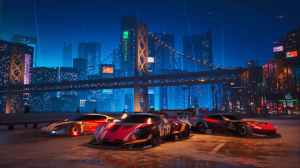The Preacher comic book series from Garth Ennis and Steve Dillon debuted in 1995 and quickly earned a passionate following, thanks to its ambitious storytelling and captivating blend of humor, horror, and fantasy. The series followed the exploits of Jesse Custer, a preacher endowed with the “Voice of God,” allowing him to utter any number of commands that a listener was compelled to follow. After years of various studios and networks attempting to adapt the property into a live-action production, Seth Rogen, Evan Goldberg, and Sam Catlin cracked the code at AMC, finding their own Custer in actor Dominic Cooper back in 2016.
Videos by ComicBook.com
With Custer being a beloved comic book character, Cooper had his work cut out for him in finding a way to bring the character to life in a way that would honor the comics yet avoided the character constantly being compared to the source material. Over the course of the first three seasons, thanks to both Cooper’s talents and the nature of the narrative, fans have seen a unique interpretation of Custer which feels both familiar and wholly unique.
ComicBook.com recently caught up with Cooper to discuss the ambitious nature of the series, finding his unique perspective, and concluding the series with the current fourth season.

ComicBook.com: People have been trying to adapt Preacher into a movie or TV series for decades, but the inherent absurdity has made that difficult. Luckily, your series hasn’t had to hold back on any of the bizarre or controversial elements that made the comic book a hit, so are you surprised that you’ve gotten away with this much for this long?
Dominic Cooper: From the word go I was completely surprised. I mean, we threw out something crazy in the first episode, I think, or sometime in the first season. From that point onward I actually knew, and knowing the comics I always wondered, and many people tried, but how are we possibly going to lift this from the page, or how is it going to be allowed? The wonderful thing is that AMC and Sony, what they managed to do, and what they constantly strive for, is that they are required to push it further. What’s so wonderful about this last season is that they knew it was coming to an end so they literally did everything and anything, and wouldn’t take no for an answer.
They had the responsibility to both the original fans and the new fans of the TV show to take it to the extreme, and they had a job to do because they’d introduced a lot of the characters from the comics that all deserved their own paths and their own storylines, and I think they’ve really managed to wrap that up quite neatly.
Within the chaos they’ve also brought a very human story with heart, which is what I thought was so creative in the beginning, was to embed it in a reality. The creation of the town that Jesse goes back to, to understand who Jesse is, to see him struggle and try in the beginning to please his father because he’s so full of the guilt of his father’s death. Then the journey starts from there.
It became normalized quite quickly, the madness, the chaos, and the carnage, and that’s what I loved so much about making it, because you could explore that as an actor, on every level. You could be beginning the day doing a quick comedic scene with a ludicrous character, and then you could be doing a very emotionally-driven scene the next part of the day, and then you could be doing a huge, very extravagant fight sequence, which is ultimately what the comic is. It’s a snapshot of the society which this one person saw, and the world in which we’re living in is so chaotic at the moment. Actually none of these things, ultimately they’re taken to an extreme, but they’re not as ludicrous as many of the things that are happening in the world that we live in.
The first three seasons of the series took their time to explore this strange world, allowing audiences to see dramatic encounters play out between characters, methodically moving the narrative forward. The first episodes of this final season have more urgency to them, now that the storyline needs to be wrapped up. Was there a feeling of that sense of urgency while filming this final season?
I think that’s exactly it. I went to the writers’ room early on and saw they had, just as you said, they had the freedom to push everything further, and therefore they had the real responsibility, they just had to go for it. There couldn’t be any of that lethargy or sitting around, or having those scenes where we’re waiting around for something to happen. It was all happening, everything, from everyone’s perspective. And each and every script that came through, you could understand why. It felt like it was the same show with more adrenaline. They must have found it hard to give each and every character the equal weights they deserved, and they seem to have done that.
They’ve introduced so many elaborate and brilliant characters. There’s such a wealth of material from those original comics, and they’ve managed to choose all the best of it, and as we were filming, it was sad because sometimes the stories were so separated because they had to be. Your characters wouldn’t cross as much as you would have liked them to, but they did, they all do. We all meet each other and we all get the answers that we need and crave, and the answers the audience needs, and wants, and deserve after having watched it.
The previous seasons have always been influenced by the comics but felt like an entirely different storyline. With the new season’s opening credits, we’re given a glimpse of Jesse with an eyepatch, which will surely excite fans at the ways this final season will borrow elements more directly from the comics.
The memory of the comic is such an important part of the imagery about him with that patch, such as those incredible illustrations. And it’s choosing how to, I suppose, weave that into an already established storyline and allow it to continue, without just making it for the purpose of, “Well that was in the comics so we must include it.” The writers have managed to put a distinctive storyline behind each of those very memorable moments from the comics, and that seemed really important, and sad that not all of them could be achieved, but a majority of them are. I think that’s what they’ve done so well in such a short amount of time that they had.
Your version of Jesse isn’t an exact adaptation of the Jesse from the comics, you’ve made the character your own. How does your approach to the character for Season Four compare to your approach to the character in Season One in regards of either using or avoiding the source material?
That’s a really good question. I often did [reference the comics], this season in particular, actually.
I have to say, it was a very daunting prospect playing someone so far removed, from such a different place, and the background and the landscape. What’s wonderful about those comics is they’re almost storyboards in themselves. I think why you loved them so much, and why people loved them so much, is that you create the film in your head as you’re reading them and the dialogue is brilliant and you get a real understanding of how that person responds and behaves in certain situations, and so I would often go back to the point in the comics that they were loosely basing the parts of the TV show on, and see how he was dealing with it, and it often helped a lot.
At first, I didn’t so much because we were doing prequels to the original source material, and I wanted to make a fully rounded, real man who was struggling with his path, and was heading back to disaster, just trying to find answers in a world that he’d already left. There wasn’t much in the comics to help with that, and then further down the line it helped more and more to look back upon them. He is very complex to the point where I never truly just walked on to set and found myself just completely at one with him. He’s difficult, and he’s not the character in the show that is the colorful [comics] character, he’s quite dark and, not monosyllabic in many ways, but he’s a man of few words. I think that to believe that that was enough, or interesting enough, sometimes was terrifying. Going back to the source material often helped because that is who he is, and he’s the hero in the center of this chaos.
He’s been a difficult one to really unearth, and to get to the heart of. He’s been a constant challenge.
When the series first debuted, it’s hard not to compare those episodes to the comics, potentially frustrating viewers with how different Jesse was from the comics. Retroactively, we can now fully appreciate everything you’ve done with the character and the more deliberate pace of his development over the course of the series and the way you’ve made the character your own.
Thank you, that means a lot. That means a great deal to me.
With you saying that this final season will go all-out with what it attempts to accomplish, is there an episode or sequence that you’re particularly excited for audiences to see?
There’s a fight sequence that I’d worked very hard on that we managed to do in one take, which I thought was going to be cut down massively but it goes on and on and on, and I did all the choreography, I learned all the moves, and we did it as one piece. It’s a very elaborate and very different-looking stunt sequence. It’s one of the best I’ve ever seen, certainly one of the best I’ve ever been part of. All credit to the guys that we were working with to put those together, because they always seemed to have a reason to move the story forward. It’s what I liked. In a very valued show, something like that can become gratuitous, that’s what they managed to not do with it. There’s one particular one, I can’t remember which episode it happens in, Jesse finds out some terrible things that have taken place in his house and he takes absolutely everyone out. It’s a really exciting, funny, at the same time shocking, sequence.
Which is interesting because in the first season, there’s an all-out brawl in a motel room that audiences only get to witness through a hole in the wall, leaving us to imagine what the mayhem looks like, and this scene pulls the camera out to finally let us witness such a complex scene.
Yes, that’s so true actually. That’s exactly it. And also when the camera pulls back on that moment, it’s very similar to the actual graphic novel. I thought in the original comic book it looked like sequences with storyboarded pieces, or like a piece of film running through a projector. It’s unlike anything I’ve ever seen. It’s huge. And good fun to do.
*****
Catch new episodes of the final season of Preacher on Sunday nights on AMC.








